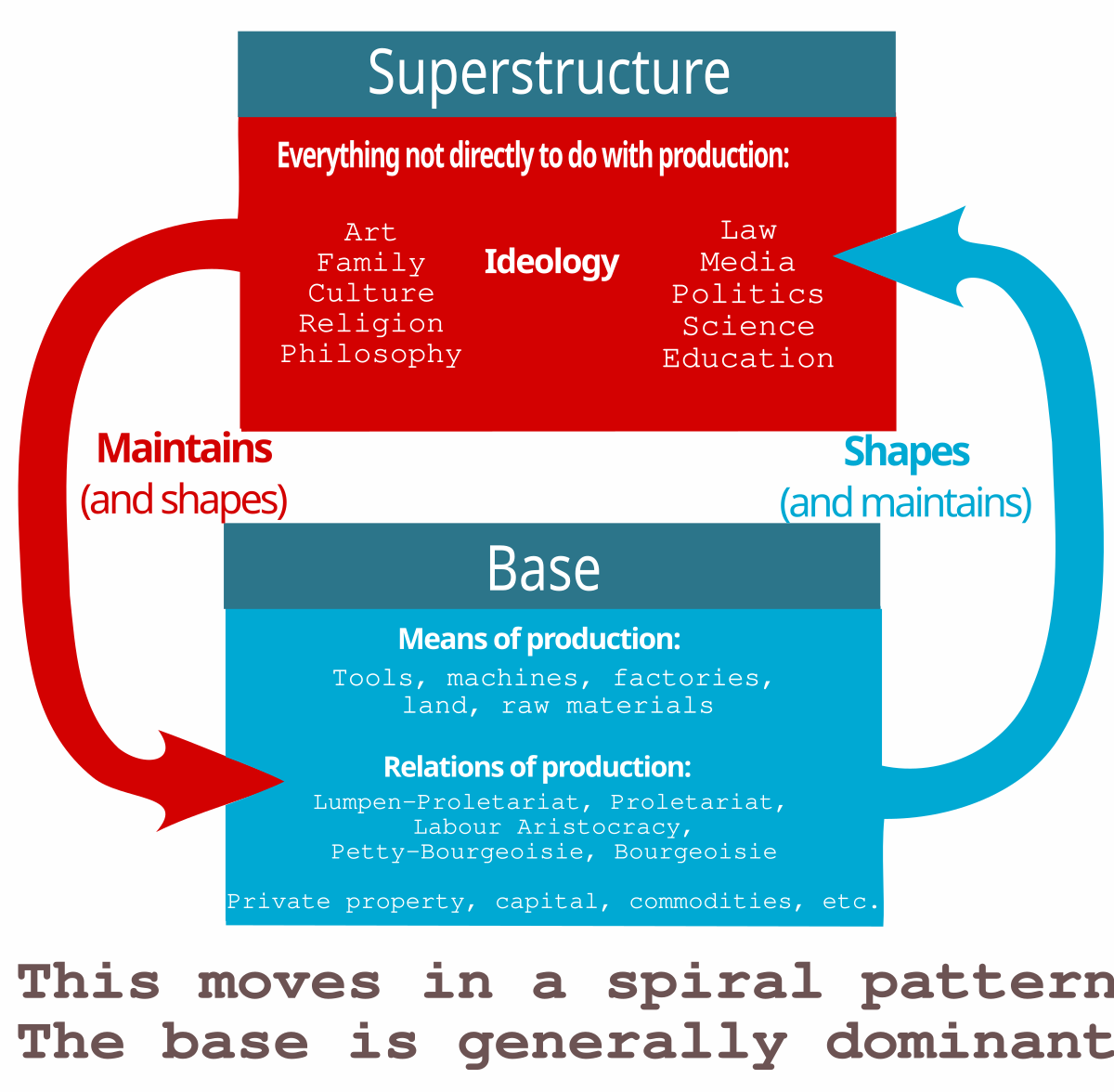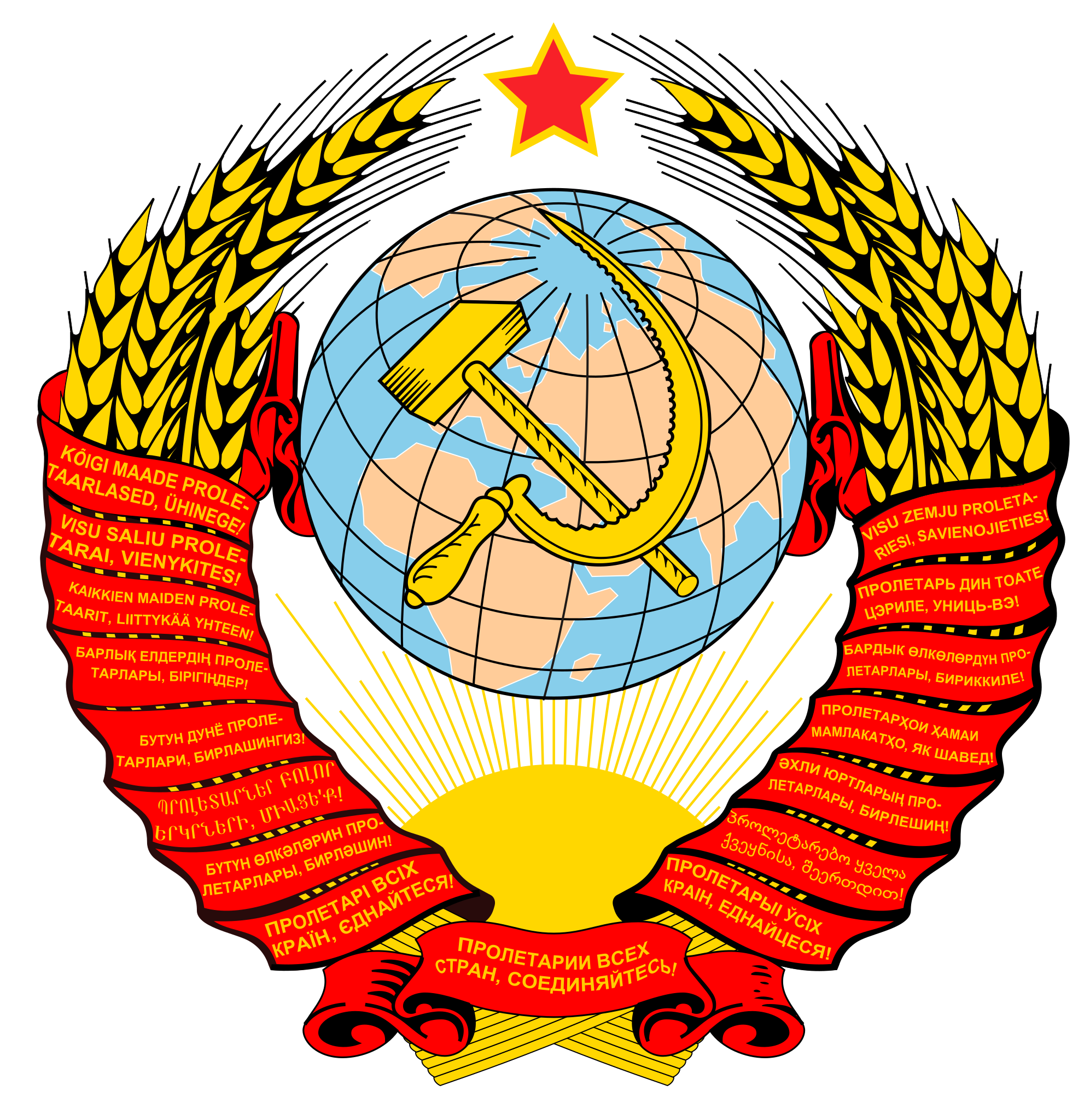I was a far-right lunatic until about 2009, when I started turning left. I have read many (center-)leftist articles from Jacobin, Common Dreams, The Guardian, and, from Brazil, Carta Capital and IHU (Catholic liberation theology).
Lemmy (despite my suboptimal instance) and communist friends got me interested in actual Marxism, but I have not yet really studied it. So please recommend:
- The best Marxist Lemmy instance for my background.
- Marxist books or videos in approximate reading/watching order. For the next many months (I suspect six months) I will have very little time, though.
Bonus:
- reasonable tolerance of Catholic faith and individual morality
- contextualized on Brazil, Cuba, broader Latin America or China
Background: Brazilian Catholic male autistic ADHD IT analyst with an electronic engineering degree and MsC in computer science. I have a son with my wife. I highly value privacy and software freedom. I read English well, but Spanish quite poorly. Native Portuguese speaker.
EDIT: I got a lemmygrad account. I am still processing the other recommendations.
There are many Brazilian comrades on lemmygrad.ml that could help with materials in Portuguese, and I’m sure the PCB (partido comunista brasileiro) also has a good introductory reading list.
For a shorter english introduction, I maintain this crash course socialism that goes over the basics.
Thank you! This is the original poster, now with a lemmygrad account. I looked at all reading recommendations and I think I will start with your crash course. Your commitment to privacy and software freedom (being a Lemmy dev) are big positive signs to me. The working class cannot organise when Big Brother is always watching and advertisers (including political propagandists like Cambridge Analytica) use AI to individually manipulate us.
No probs! Glad I could help.
This war has many fronts, and one is who owns and controls our social media platforms. US-capitalists own nearly all of the communications platforms worldwide, and use them to advertise to us, sell us pro-US lies, turn us and our data into products, and forward that data to their government to spy on the world. Reddit is (i think) the 5th most popular site worldwide, so this is one small way I can try to help reverse that trend, and allow people to create their own social media outside of US control.
Welcome! For your first question, Lemmygrad.ml and Hexbear.net are explicitly oriented towards Marxism (Hexbear also has Anarchists and other leftist types, Lemmygrad is Marxist-Leninist). For your second, I actually wrote an introductory reading list you can check out if you want.
hexbear is kind of general leftism (anarchist, marxist leninist) with a good amount of shitposting, lemmygrad has more staunchly marxist Leninist
lemmygrad has a wiki with all the reading lists this is the absolute beginner
dessaline the creator of lemmy has a bunch of audiobooks and stuff if you prefer that instead
there is probably a brazillian communist discord i can link if you’re interested i think they have a whole section with streamers and eductional stuff. i heard about it through the deprogram podcast
not familiar with that dialect so you will have to navigate it on your own
Hi! This is the OP, now with a lemmygrad account. I thank you for your recommendations but I think the following URL is wrong:
https://hexbear.net/comment/5624975
It is a thread about Android restrictions for banking apps.
hi i do not know why it redirects to that. the url is correct on my end. the post is called “Why are leftist spaces always sabotaging themselves?”
Thank you. I now read the correct post, and layer will read the article by Jones Manoel.
Hi friend!
For what Marxist instance would be best given your background, well there are only two total, to my knowledge, so you could just try out both and see what you like best! They are Hexbear and Lemmygrad. Lemmygrad is smaller but is more focused on Marxism-Leninism in particular. Hexbear has a ML-ancom and everything in between left unity stance and places great emphasis on making the space safe for people of marginalized groups. Lemmy.ml has many Marxists but is not explicitly commie.
For reading recommendations, this can be a difficult question to answer because there are many important texts in the Marxist tradition and some of them, particularly the foundational ones, are dense and challenging to read. I do strongly recommend reading the core works of Marx and Engels, since they define Marxism and later works are based on them. The order in which to read books really depends on how you prefet to read and learn.
I prefer to read from “the beginning” and already knew the relevant philosophical background so I just read Das Kapital right after The Communist Manifesto. But reading Das Kapital takes a long time. Reading groups dedicate months just to Volume 1. If you prefer a faster introduction and summaries, then I recommend Heinrich’s companion text. Heinrich inserts some of his own opinions, but you can balance these out by reading Marxists critical of Heinrich, like Michael Roberts. If you want an even faster and simpler introduction, you can work backwards by reading short overviews from newer texts and blogs and so on and then make sure to try and tackle Capital later. But remember that the farther from the original works you get, the more likely that you will learn something incorrect about them without being in a position to notice it.
Another strategy is to start with Lenin, particularly his own notes on Hegel and Marx, and proceed to Stalin’s overview of Marxism-Leninism, which includes an overview of Marxism. These are much easier to read than the source texts. All of the works so far will have Portuguese translations.
Regarding tolerance of Catholic faith, both instances will likely not care so long as this does not mean contradicting community standards, e.g. a vocal tradcath would contradict the feminist stances of both instances. Both instances have Christian comms, similar to subreddits. Lemmygrad’s all seem to be inactive, though. Hexbear is, generally speaking, against insufferable New Atheist contrarianism (and so many of its original proponents became reactionary).
Regarding having Latin American context, both instances of course have a good amount of comrades from Latin America. I know that Hexbear has an active Latin America comm.
I think this is a good primer onto what we believe in.

The 3 components of Marxism by Lenin.
http://www.marxists.org/archive/lenin/works/1913/mar/x01.htm
IThe philosophy of Marxism is materialism. Throughout the modern history of Europe, and especially at the end of the eighteenth century in France, where a resolute struggle was conducted against every kind of medieval rubbish, against serfdom in institutions and ideas, materialism has proved to be the only philosophy that is consistent, true to all the teachings of natural science and hostile to superstition, cant and so forth. The enemies of democracy have, therefore, always exerted all their efforts to “refute”, under mine and defame materialism, and have advocated various forms of philosophical idealism, which always, in one way or another, amounts to the defence or support of religion.
Marx and Engels defended philosophical materialism in the most determined manner and repeatedly explained how profoundly erroneous is every deviation from this basis. Their views are most clearly and fully expounded in the works of Engels, Ludwig Feuerbach and Anti-Dühring, which, like the Communist Manifesto, are handbooks for every class-conscious worker.
But Marx did not stop at eighteenth-century materialism: he developed philosophy to a higher level, he enriched it with the achievements of German classical philosophy, especially of Hegel’s system, which in its turn had led to the materialism of Feuerbach. The main achievement was dialectics, i.e., the doctrine of development in its fullest, deepest and most comprehensive form, the doctrine of the relativity of the human knowledge that provides us with a reflection of eternally developing matter. The latest discoveries of natural science—radium, electrons, the transmutation of elements—have been a remarkable confirmation of Marx’s dialectical materialism despite the teachings of the bourgeois philosophers with their “new” reversions to old and decadent idealism.
Marx deepened and developed philosophical materialism to the full, and extended the cognition of nature to include the cognition of human society. His historical materialism was a great achievement in scientific thinking. The chaos and arbitrariness that had previously reigned in views on history and politics were replaced by a strikingly integral and harmonious scientific theory, which shows how, in consequence of the growth of productive forces, out of one system of social life another and higher system develops—how capitalism, for instance, grows out of feudalism.
Just as man’s knowledge reflects nature (i.e., developing matter), which exists independently of him, so man’s social knowledge (i.e., his various views and doctrines—philosophical, religious, political and so forth) reflects the economic system of society. Political institutions are a superstructure on the economic foundation. We see, for example, that the various political forms of the modern European states serve to strengthen the domination of the bourgeoisie over the proletariat.
Marx’s philosophy is a consummate philosophical materialism which has provided mankind, and especially the working class, with powerful instruments of knowledge.
IIHaving recognised that the economic system is the foundation on which the political superstructure is erected, Marx devoted his greatest attention to the study of this economic system. Marx’s principal work, Capital, is devoted to a study of the economic system of modern, i.e., capitalist, society.
Classical political economy, before Marx, evolved in England, the most developed of the capitalist countries. Adam Smith and David Ricardo, by their investigations of the economic system, laid the foundations of the labour theory of value. Marx continued their work; he provided a proof of the theory and developed it consistently. He showed that the value of every commodity is determined by the quantity of socially necessary labour time spent on its production.
Where the bourgeois economists saw a relation between things (the exchange of one commodity for another) Marx revealed a relation between people. The exchange of commodities expresses the connection between individual producers through the market. Money signifies that the connection is becoming closer and closer, inseparably uniting the entire economic life of the individual producers into one whole. Capital signifies a further development of this connection: man’s labour-power becomes a commodity. The wage-worker sells his labour-power to the owner of land, factories and instruments of labour. The worker spends one part of the day covering the cost of maintaining himself and his family (wages), while the other part of the day he works without remuneration, creating for the capitalist surplus-value, the source of profit, the source of the wealth of the capitalist class.
The doctrine of surplus-value is the corner-stone of Marx’s economic theory.
Capital, created by the labour of the worker, crushes the worker, ruining small proprietors and creating an army of unemployed. In industry, the victory of large-scale production is immediately apparent, but the same phenomenon is also to be observed in agriculture, where the superiority of large-scale capitalist agriculture is enhanced, the use of machinery increases and the peasant economy, trapped by money-capital, declines and falls into ruin under the burden of its backward technique. The decline of small-scale production assumes different forms in agriculture, but the decline itself is an indisputable fact.
(Note: Property used to make commodities are called constant capital, and are an intermediate commodity for making direct commodities)
(Note: commodities = partial bit of constant capital + necessary labor {time} (separated between laborer’s wages/variable capital and capitalist profit/surplus value)
By destroying small-scale production, capital leads to an increase in productivity of labour and to the creation of a monopoly position for the associations of big capitalists. Production itself becomes more and more social—hundreds of thousands and millions of workers become bound together in a regular economic organism—but the product of this collective labour is appropriated by a handful of capitalists. Anarchy of production, crises, the furious chase after markets and the insecurity of existence of the mass of the population are intensified.
Expropriation: the seizure of small-scale property, usually to develop a more concentrated, technologically advanced mode of production
By increasing the dependence of the workers on capital, the capitalist system creates the great power of united labour.
(Appropriation: the seizure of surplus value)
Marx traced the development of capitalism from embryonic commodity economy, from simple exchange, to its highest forms, to large-scale production.
And the experience of all capitalist countries, old and new, year by year demonstrates clearly the truth of this Marxian doctrine to increasing numbers of workers.
Capitalism has triumphed all over the world, but this triumph is only the prelude to the triumph of labour over capital.
III When feudalism was overthrown and “free” capitalist society appeared in the world, it at once became apparent that this freedom meant a new system of oppression and exploitation of the working people. Various socialist doctrines immediately emerged as a reflection of and protest against this oppression. Early socialism, however, was utopian socialism. It criticised capitalist society, it condemned and damned it, it dreamed of its destruction, it had visions of a better order and endeavoured to convince the rich of the immorality of exploitation.
But utopian socialism could not indicate the real solution. It could not explain the real nature of wage-slavery under capitalism, it could not reveal the laws of capitalist development, or show what social force is capable of becoming the creator of a new society.
Meanwhile, the stormy revolutions which everywhere in Europe, and especially in France, accompanied the fall of feudalism, of serfdom, more and more clearly revealed the struggle of classes as the basis and the driving force of all development.
Not a single victory of political freedom over the feudal class was won except against desperate resistance. Not a single capitalist country evolved on a more or less free and democratic basis except by a life-and-death struggle between the various classes of capitalist society.
The genius of Marx lies in his having been the first to deduce from this the lesson world history teaches and to apply that lesson consistently. The deduction he made is the doctrine of the class struggle.
People always have been the foolish victims of deception and self-deception in politics, and they always will be until they have learnt to seek out the interests of some class or other behind all moral, religious, political and social phrases, declarations and promises. Champions of reforms and improvements will always be fooled by the defenders of the old order until they realise that every old institution, how ever barbarous and rotten it may appear to be, is kept going by the forces of certain ruling classes. And there is only one way of smashing the resistance of those classes, and that is to find, in the very society which surrounds us, the forces which can—and, owing to their social position, must—constitute the power capable of sweeping away the old and creating the new, and to enlighten and organise those forces for the struggle.
Marx’s philosophical materialism alone has shown the proletariat the way out of the spiritual slavery in which all oppressed classes have hitherto languished. Marx’s economic theory alone has explained the true position of the proletariat in the general system of capitalism.
Besides that, imperialism is not simply “a policy of extending a country’s power and influence through diplomacy or military force.”
It is a system culminating from the growing capitalist mode of production.
Imperialism is the {higher} stage of capitalism by Lenin, defined by
-
Dominance of capitalist monopolies in everyday life
-
Bank capital (think shareholders and money-lenders) + industrial capital (think factories and mass production ) --> Finance capital, whose surplus value is increasingly dominated by dividends and interest, rather than industrial profit of enterprise.
You might call this rentier capital.
-
Export of capital around the world is dominant, rather than export of commodities, in search of new sources of surplus value
-
International capitalist monopolies are established
-
Territorial division and redivision of the colonized world, on the basis of monopoly capitalism. (even then, under neo-colonialism, you don’t need to even occupy; you just have to exert economic and military dominance/hegemony on the ‘ex-colonies’)
Thus, it is important to be anti-imperialist, in the sense of Lenin.
If ye wanted a book recommendation intro, here’s one by Cowbee
https://lemmy.ml/post/22417306
There’s also this one.
Basic Marxism-Leninism study plan
This is the Marxism-Leninism “basic study plan” of the Anti-Imperialism Movement (Movimiento Anti-Imperialista or MAI). I think this is a very decent set of texts to read, so I’ve translated the original list and added links to all English and free-to-read versions available online. Since people very often ask for this kind of thing I hope some of you will find it useful.
You can find these at marxists.org
Introduction Lenin. The three sources and three component parts of Marxism
Marx, Engels. Manifesto of the Communist Party
Historical Materialism
Marx, Engels. The German Ideology, chapter 1
Scientific Socialism
Engels. Socialism: Utopian and Scientific
Lenin. Texts against revisionism and opportunism:
The historical destiny of the doctrine of Karl Marx
Opportunism and the collapse of the Second International
The collapse of the Second International
Imperialism and the split in Socialism
Certain features of the historical development of Marxism
Lenin. Left-wing Communism: and infantile disorder
Engels. Anti-Dühring, part III: Socialism
Stalin. The foundations of Leninism
Philosophy
Engels. Anti-Dühring, part I: Philosophy
Engels. Ludwig Feuerbach and the end of classical German philosophy
Political Economy
Marx. Wages, price and profit (Ouais)
Engels. Anti-Dühring, part II: Political Economy
Marx. Capital Volume I (This is a big one; oof)
-
Read The Principles of Communism and Socialism: Utopian and Scientific by Friedrich Engels. People usually recommend The Communist Manifesto as an introduction, but in my honest opinion it can be skipped entirely. (These can all be read for free on marxists.org, and there might even be Portugese translations on there)
Also, the youtube channel Socialism For All has a lot of audiobooks of Marxist texts, although they are in English.
The podcast Revolutionary Left Radio is worth checking out.
r/communism reading list or ProleWiki reading list. A lot of these books are available in Portuguese on ProleWiki or if not you can go to marxists.org
Cowbee (auth, btw, jsyk) has an intro reading list: https://lemmy.ml/post/22417306
Don’t know what you mean by “auth,” it’s pretty standard Marxism, but thanks for linking it!
I was describing your ideology more so than your reading list, in case that wasn’t clear. Iirc though, you’ve said something along the lines of not feeling “authoritarian” is an appropriate political descriptor at all
My ideology is Marxist-Leninist, the list I made reflects that. I agree with Engels with respect to “authoritarianism” as a concept, elaborated on in On Authority. Generally, it isn’t a useful descriptor for many things, or rather it is so overused and under-examined that it ends up simplifying concepts to the point that they become more confusing.
Liberty is the iron fist of the invisible hand, and authoritarianism is the tyranny of the wage-slave majority.
Liberation theology is wonderful and very specific to Latin America. Marx and the Bible is a great book. It was originally written in Spanish and took a while to be published in English; surely there is a Portuguese edition somewhere. Edit: Gutierrez’s Theology of Liberation is also 🔥
As socialist as liberation theology may (or may not) be, theologies are idealist, not materialist, and therefore not Marxist.
Hi. This is me (the original poster) on my new Lemmygrad account. I thank you for providing your viewpoint. However I still believe liberation theology is useful at least for:
- Inspiring my individual and familiar decisions
- Communicating with fellow Christians. A significant majority of Brazil is Christian, especially the workers.
That’s fine. I’m not interested in crushing liberation theology. I’m only pointing out that Marxism is an atheistic school of thought. For an easily digestible deep dive I would suggest Elementary principles of philosophy.
You can probably find a Portuguese translation of the textbook Los conceptos elementales del materialismo histórico by Marta Harnecker. I’m not a native Spanish speaker but I was able to work my way through it and I’ve found it helpful. It’ll explain a lot of the basic jargon used by Marxists in a straightforward way that will help you in other reading.
I found a pdf, though it’s not high quality.
deleted by creator
I haven’t seen any Marxists shit on it myself. In fact it’s available on ProleWiki.
deleted by creator
I find 99% of why the left fails is self policing on bullshit that doesn’t matter
Mostly we fail because we live in the imperial core, and we have been suppressed, purged, and even assassinated by it for over a century.
China is just ethnofascist at this point (cue the CCP downvoters and haters)
Ask and you shall receive. You’ve been taken in by your own country’s Cold War II propaganda. Previously, previously, previously.
deleted by creator
where the one big family bed has an assigned state bureaucrat who sleeps with your family
Do you have actual evidence, or are you accepting the testimonials of CIA-backed radical fundamentalist Islamist Uyghurs? Previously.
deleted by creator
So your claim is no Chinese bureaucrats ever slept in Uighur beds, embedded with them?
No, my claim is: what are you even talking about, and where is your evidence? Is “Chinese bureaucrats sleeping in beds” a metaphor for something, or are you talking about literal beds? What a bizarre thing to say.
Edit to add: This is what you take at face value? https://www.vice.com/en/article/male-chinese-officials-monitoring-uighur-women-sleeping-same-bed/
A cadre from the ruling Communist Party in Kashgar, Xinjiang, who wished to stay anonymous, told RFA that between 70 and 80 families in his township were put through the program.
You know what Radio Free Asia is, right?


Please consider developing some real media literacy. Previously.
Ethnofascist? JFC.
Don’t listen to this person. You can trust me, I’m actually a commune of 13 Uyghurs that writes like a Redditor and parrots US propaganda right down to its terminology. Ask me about lived experience.
Yes, as a lower class Uighur, my lived experience is CCP good
Do you often pretend to be someone you’re not online? Is that why do you delete all of your posts & comments that are more than a week old? Curiouser and curiouser…
LOL, making the Third Amendment to the Constitution of the USA relevant?!? What the fuck are you on? You’re a lower class Uighur with lived experience of the CPC but you view the world through the lens of the American Constitution as it was ratified in the late 1700s?
Get bent.
You might try also asking !brasil@lemmygrad.ml.
The Jakarta Method by Vincent Bevins mentions Brazil quite a bit.
Marxist-Lemmyisim.
Way more chill and non-toxic than Reddit’s r/Communism
I translated the communist manifesto into a rap for people who want a quick intro https://youtu.be/0Rw0QvEjwuQ












